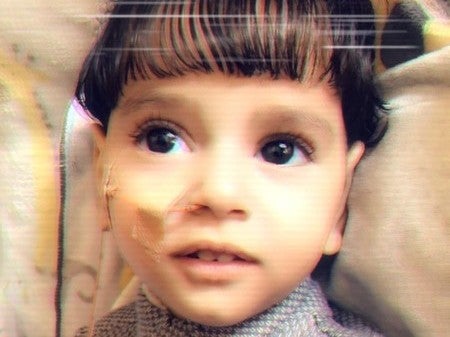Trump travel ban keeps Yemeni mother from visiting critically ill two-year-old son in California
'Not being able to be there in your child's last moments is unfathomably cruel'

Your support helps us to tell the story
From reproductive rights to climate change to Big Tech, The Independent is on the ground when the story is developing. Whether it's investigating the financials of Elon Musk's pro-Trump PAC or producing our latest documentary, 'The A Word', which shines a light on the American women fighting for reproductive rights, we know how important it is to parse out the facts from the messaging.
At such a critical moment in US history, we need reporters on the ground. Your donation allows us to keep sending journalists to speak to both sides of the story.
The Independent is trusted by Americans across the entire political spectrum. And unlike many other quality news outlets, we choose not to lock Americans out of our reporting and analysis with paywalls. We believe quality journalism should be available to everyone, paid for by those who can afford it.
Your support makes all the difference.The Yemini mother of a critically ill two-year-old is unable to visit her son in hospital because of the US travel ban, rights activists say.
Abdullah Hassan was born in Yemen with a genetic brain condition that initially affected his ability to walk and talk, but has now left the toddler unable to breathe on his own.
His father, Ali, lives in Stockton, California. Mr Hassan and his son are both US citizens.
Mr Hassan brought Abdullah to California for medical treatment a few months ago, the Council on American-Islamic Relations (CAIR) said.
Abdullah is now on life-support at the UCSF Benioff Children’s Hospital in Oakland but his mother, who lives in Egypt, is unable to visit him.
Shaima Swileh is unable to travel to the US “despite her child’s life being in the balance” due to the Trump administration’s ban on Yemeni nationals entering the country, CAIR said.
The ban prevents travellers, immigrants and visa holders from Yemen, Iran, Libya, Somalia, Syria, North Korea and Venezuela from entering the US.
Mr Trump signed the restriction into law after spending his 2016 election campaign calling for a “total and complete shutdown” on any Muslims travelling to the US “until our country’s representatives can figure out what is going on”.
The first iteration of his travel ban was dubbed the “Muslim ban” by critics and caused mass protests across the country.
In June the Supreme Court upheld the third version of the travel ban.
Ms Swileh has applied for a ban waiver but it is still pending, even as Abdullah’s condition worsens.
Doctors have indicated that the toddler’s body is unlikely to withstand life support for much longer and she may be in Egypt during Abdullah’s last days.
“All she wishes is to hold his hand for the last time,” Ali Hassan told The San Francisco Chronicle.
“Our hearts are breaking for this family,” said Saad Sweilem, a civil rights lawyer working in CAIR’s Sacramento Valley office.
The organisation has plans to go to court on Ms Swileh’s behalf, to force the government to expedite their response to the waiver application.
“The loss of a child is something no parent should experience,” Mr Sweilem said ”but not being able to be there in your child’s last moments is unfathomably cruel.”
“From the crisis at our border to the Muslim Ban, this administration is doing everything in its power to undermine immigrants’ rights and uphold a xenophobic agenda that tears families apart.”
Join our commenting forum
Join thought-provoking conversations, follow other Independent readers and see their replies
Comments